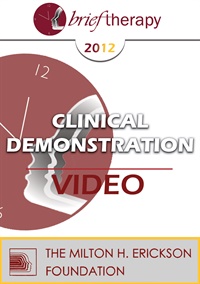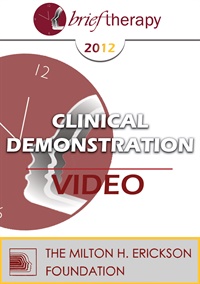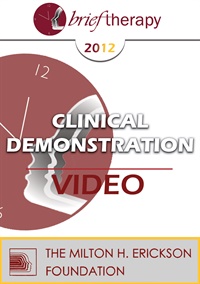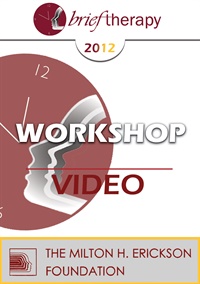
- Average Rating:
- Not yet rated
- Topic Areas:
- Clinical Demonstrations | Trance | Generative Psychotherapy
- Categories:
- Brief Therapy Conference | Brief Therapy Conference 2012
- Faculty:
- Stephen Gilligan, PhD
- Course Levels:
- Master Degree or Higher in Health-Related Field
- Duration:
- 59:15
- Format:
- Audio and Video
- Original Program Date:
- Dec 07, 2012
- Short Description:
- This demonstration will show how problems/symptoms may be viewed as attempts by the creative unconscious to bring transformation and healing, and how the development of a generative trance can allow that transformation to be realized.
- Price:
-
Sale is $29.00
price reduced from Base Price - $59.00

- Average Rating:
- Not yet rated
- Topic Areas:
- Clinical Demonstrations | Consciousness
- Categories:
- Brief Therapy Conference | Brief Therapy Conference 2012
- Faculty:
- Ernest Rossi, PhD
- Course Levels:
- Master Degree or Higher in Health-Related Field
- Duration:
- 1:00:54
- Format:
- Audio and Video
- Original Program Date:
- Dec 07, 2012
- Short Description:
- BT12 Clinical Demonstration 05 - Creating Consciousness with Activity-Dependent Gene Expression and Brain Plasticity - Ernest Rossi, PhD The new Neuroscience of utilizing Implicit Processing Heuristics in facilitating the 4-stage creative process in the construction and creative reconstruction of fear, stress and post traumatic memories and symptoms during brief psychotherapy will be demonstrated with the entire audience, as well as a volunteer.
- Price:
-
Sale is $29.00
price reduced from Base Price - $59.00
Tags: Consciousness

- Average Rating:
- Not yet rated
- Topic Areas:
- Clinical Demonstrations
- Categories:
- Brief Therapy Conference | Brief Therapy Conference 2012
- Faculty:
- Bill O'Hanlon, MS
- Course Levels:
- Master Degree or Higher in Health-Related Field
- Duration:
- 59:20
- Format:
- Audio and Video
- Original Program Date:
- Dec 07, 2012
- Short Description:
- BT12 Clinical Demonstration 07 - The Art of Making Small Changes in Brief Therapy - Bill O’Hanlon, MS It is often easier for clients to make small rather than dramatic changes. This demonstration will show how to help people make the smallest change to make a significant difference in moving out of their problems and suffering. This method can be especially useful for clients who are reluctant to or resistant to change.
- Price:
-
Sale is $29.00
price reduced from Base Price - $59.00

- Average Rating:
- Not yet rated
- Topic Areas:
- Clinical Demonstrations | Psychotherapy | Somatic Experiences
- Categories:
- Brief Therapy Conference | Brief Therapy Conference 2012
- Faculty:
- Peter Levine, PhD
- Course Levels:
- Master Degree or Higher in Health-Related Field
- Duration:
- 57:09
- Format:
- Audio and Video
- Original Program Date:
- Dec 07, 2012
- Short Description:
- BT12 Clinical Demonstration 09 - Somatic Psychotherapy - Peter Levine, PhD Somatic Experiencing® - a short-term naturalistic approach to the resolution and healing of trauma. Levine addresses the issues at the heart of trauma and attachment; the upcoming DSM-5 Diagnoses and Disorders and the most effective and promising treatment modalities available to clinicians today.
- Price:
-
Sale is $29.00
price reduced from Base Price - $59.00
Tags: Somatic Experiences

- Average Rating:
- Not yet rated
- Topic Areas:
- Clinical Demonstrations | Hypnosis
- Categories:
- Brief Therapy Conference | Brief Therapy Conference 2012
- Faculty:
- Michael Yapko, PhD
- Course Levels:
- Master Degree or Higher in Health-Related Field
- Duration:
- 57:17
- Format:
- Audio and Video
- Original Program Date:
- Dec 07, 2012
- Short Description:
- Contrary to the popular mythology about hypnosis, clinical hypnosis enhances personal mastery by promoting greater self-awareness, increasing access to personal resources, and amplifying of a sense of personal agency in actively choosing growth-oriented responses. How hypnosis can help empower people will be highlighted in this clinical demonstration.
- Price:
-
Sale is $29.00
price reduced from Base Price - $59.00
Tags: Hypnosis

- Average Rating:
- Not yet rated
- Topic Areas:
- Keynotes
- Categories:
- Brief Therapy Conference | Brief Therapy Conference 2012
- Faculty:
- Harriet Lerner, PhD
- Course Levels:
- Master Degree or Higher in Health-Related Field
- Duration:
- 1:02:38
- Format:
- Audio and Video
- Original Program Date:
- Dec 07, 2012
- Short Description:
- BT12 Keynote 03 – Remarkable Acts of Change: From Theory to Practice – Harriet Lerner, PhD Dr. Lerner will offer clinical examples of how she uses straightforward “coaching” that invites clients, in relatively few sessions, to experiment with bold acts of change that can change everything. She will outline the theoretical perspective that guides this work, and share her personal experience with systems- based remarkable acts of change.
- Price:
- $29.00 - Base Price

- Average Rating:
- Not yet rated
- Topic Areas:
- Keynotes | Addiction
- Categories:
- Brief Therapy Conference | Brief Therapy Conference 2012
- Faculty:
- Patrick Carnes, PhD, CAS
- Course Levels:
- Master Degree or Higher in Health-Related Field
- Duration:
- 1:07:07
- Format:
- Audio and Video
- Original Program Date:
- Dec 08, 2012
- Short Description:
- BT12 Keynote 04 – Bargains with Chaos: Challenges and Choices – Patrick Carnes, PhD, CAS We witness a continuous parade of stars, financial gurus, clergy, politicians and athletes who enter rehabs sometimes repetitively. Is this about media coverage or are these elite canaries in the coal mines of our culture signifying a greater danger? Our understanding of addictions with the aid of neuroscience is expanding dramatically. With it is the realization of cultural and scientific shifts which underline the therapist’s role in facing our number one public health problem. One of the gifts of this challenge is our growth in technology which will transform what every therapist does for a living and maybe how humans evolve. But maybe we professionals are like the famous—reluctant to face difficult realities.
- Price:
- $29.00 - Base Price
Tags: Addiction Neuroscience

- Average Rating:
- Not yet rated
- Topic Areas:
- Workshops | Therapeutic Relationship | Brief Therapy
- Categories:
- Brief Therapy Conference | Brief Therapy Conference 2012
- Faculty:
- Erving Polster, PhD
- Course Levels:
- Master Degree or Higher in Health-Related Field
- Duration:
- 2:25:14
- Format:
- Audio and Video
- Original Program Date:
- Dec 06, 2012
- Short Description:
- Dr. Polster will flesh out the roles of an attention triad of concentration, fascination and curiosity in evoking amplified interpersonal immersion in the therapeutic process. The resulting involvement leads to a quasi-hypnotic energy opening the client to new experience. Conceptual perspectives will be elaborated, augmented by live demonstrations of therapy sessions.
- Price:
-
Sale is $29.00
price reduced from Base Price - $59.00

- Average Rating:
- Not yet rated
- Topic Areas:
- Workshops
- Categories:
- Brief Therapy Conference | Brief Therapy Conference 2012
- Faculty:
- Bill O'Hanlon, MS
- Course Levels:
- Master Degree or Higher in Health-Related Field
- Duration:
- 2:43:34
- Format:
- Audio and Video
- Original Program Date:
- Dec 08, 2012
- Short Description:
- BT12 Workshop 30 – Changing the Doing, Viewing and Context: The Essence of All Brief Therapy – Bill O’Hanlon, MS After making a connection with and establishing a relationship with the client, I contend that all brief therapy relies on some variation or combination of three interventions: Changing the doing (actions/interactions), changing the viewing (focus of attention and meaning attribution/interpretation) and changing the context (the social or physical environment) involved in or around the problem. The session will give details about how to conceptualize and implement these shifts in brief clinical work.
- Price:
-
Sale is $29.00
price reduced from Base Price - $59.00

- Average Rating:
- Not yet rated
- Topic Areas:
- Workshops | Obsessive Compulsive Disorder (OCD)
- Categories:
- Brief Therapy Conference | Brief Therapy Conference 2012
- Faculty:
- Reid Wilson, PhD
- Course Levels:
- Master Degree or Higher in Health-Related Field
- Duration:
- 2:45:17
- Format:
- Audio and Video
- Original Program Date:
- Dec 08, 2012
- Short Description:
- BT12 Workshop 39 – The Art of Persuasion: Changing the Mind on OCD – Reid Wilson, PhD Persuading OCD clients to adopt a new frame of reference is the therapist’s primary task. Altering perception– not adding technique–helps them change directions, because belief always trumps exposure practice. Participants will learn a persuasive strategy–built out of whole cloth within the first session–that will frame the entire treatment protocol.
- Price:
-
Sale is $29.00
price reduced from Base Price - $59.00
Tags: OCD
Please wait ...

